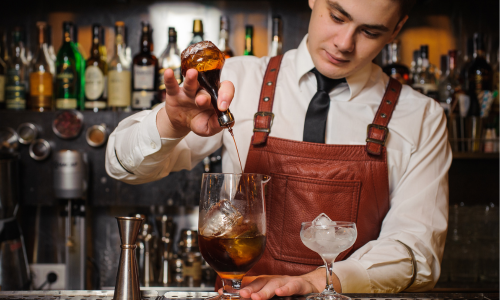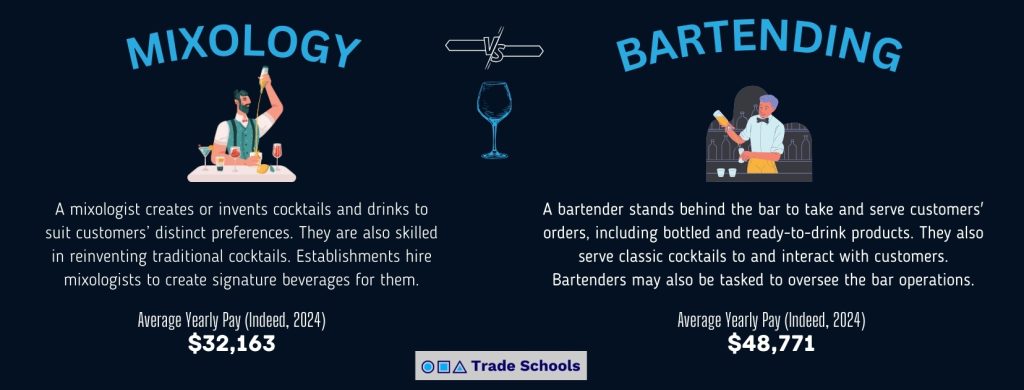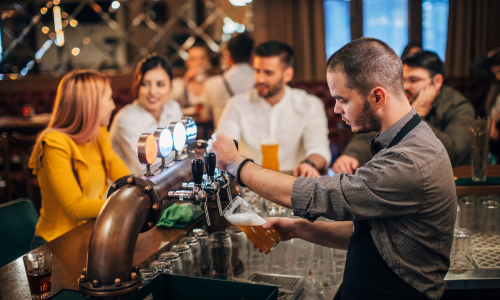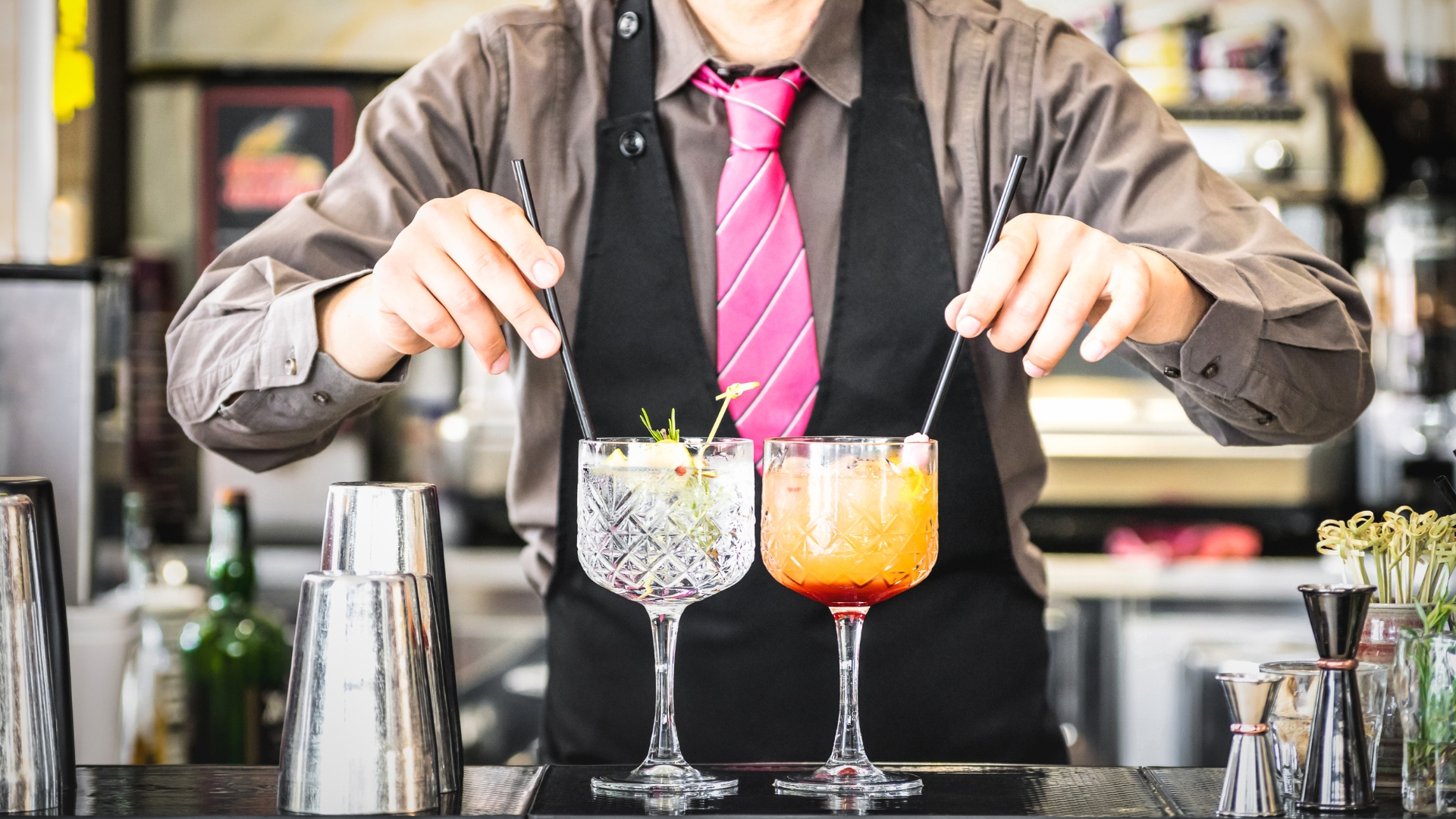Mixology and Bartending can be satisfying careers if you love entertaining people with superb drinks and excellent customer service. These two careers closely resemble each other to the point where people think “mixologist” is just a fancy term for bartenders, especially at premium establishments.
Furthermore, the country’s Labor Statistics Bureau simply puts Mixologists under the Bartenders category in its Occupational Outlook Handbook. In addition, trade schools often use the terms interchangeably when discussing their Mixology and Bartending training programs.
If you take a closer look at these fun and rewarding trade careers, however, you’ll discover that there are distinct differences between the two, especially when it comes to training and education and the scope of work involved.
Mixology as a Trade Program

Entry-level positions for mixologists typically don’t require formal education, and you may also gain the necessary skills through on-the-job training working in other jobs in the food preparation and serving industry. Some establishments, however, will prefer or require their mixologists to have at least a high school diploma.
To boost your career opportunities, you can attend affordable trade career programs offered by community colleges, Bartending schools, or online training providers such as the Institute of Culinary Education.
These programs provide a structured curriculum that lets you gain the essential skill set necessary to succeed in Mixology, with courses that focus on:
- Serving customers
- Mixing classic cocktails
- Understanding ingredients and their properties
- Creating innovative drinks
Most often, Mixology courses are a part of many Bartending training programs.
Becoming a Mixologist
| Starting Salary | $14,997 per year (Indeed) |
| Average Salary | $32,163 per year (Indeed) |
| Duties | * Focuses more on creating the cocktails and drinks * Creates signature drinks that complement the establishment and the menu * May accept challenges from customers who want to experience unique drinks that suit their preferences * Reinvents traditional cocktails |
| Projected Job Growth (2022-2032) | 3% |
| Largest Employer(s) | Restaurants and dining establishments |
| Highest Paying Employer(s) | Performing arts companies |
What It Takes to Become a Mixologist
Hard skills, or those that can be obtained through training and education:
- Knowledge of a wide variety of drinks and beverages, including their composition and compatibilities
- Ability to determine the best beverages to pair with food items on the menu
- Ability to create new drinks to suit customer preferences or signature drinks to suit the establishment’s ambiance and menu
- Excellent memory, especially for cocktail and drink combinations
- Math and computational skills
Soft skills, or those that you can naturally develop in your life:
- Communication skills
- Customer service skills
- Creativity in discovering new drinks and making variants of classic ones
- Multitasking and organization skills
- Physical stamina
- Sales skills for upselling or promoting specials
- Cultural awareness for identifying the drink preferences of customers
- Decision-making skills, especially for identifying customers who need to be denied service
Advance Your Career in Mixology
You can further your Mixology career by obtaining optional professional certifications that will reflect your competency and knowledge in Bartending procedures.
In around 17 states, mixologists and their employers are required to have training certification before they can serve alcohol. These state training programs cover laws relevant to the sale of alcoholic drinks, conflict resolution and responsible service practices.
Why you should be a Mixologist:
- You have the enthusiasm to experiment and create new drinks based on your deep knowledge of foods and beverages.
- You are passionate about taking challenges from customers who want to experience unique drinks or taste new variations of classic cocktails.
- You thrive in a working environment that fosters social interaction and networking.
Why you should NOT become a Mixologist:
- You don’t want to work on a night or graveyard shift, considering that most customers only have the time to drink after their regular work hours.
- You may encounter challenges in handling alcoholic beverages.
- You have a low tolerance for high-stress working environments because you need to serve customers efficiently and quickly.
Let’s Compare: Mixology vs Bartending

Bartending as a Trade Program
If the idea of creating and serving drinks to customers piques your interest, bartending may be one of the best trade careers you can pursue!
Just like Mixology, you don’t generally need formal education for entry-level Bartending jobs. However, employers typically prefer their bartenders to have a high school diploma.
Becoming a bartender entails completing a relevant vocational or technical program in the country’s leading trade schools in the country. Essentially, bartending students learn to:
- Mix drinks proficiently
- Prepare standard cocktails
- Provide excellent customer service
- Utilize effective sanitation methodologies
- Identify problem customers
- Evaluate intoxication levels of patrons
- Comply with alcohol consumption laws
Examples of these Bartending programs include:
- Anne Arundel Community College’s Bartending Certification program
- Housatonic Community College’s SMART Professional Bartending Certification
Becoming a Bartender
| Starting Salary | $25,063 per year (Indeed) |
| Average Salary | $48,771 per year (Indeed) |
| Duties | * Generally stands behind the bar to take customers’ orders * Serves customers with the drinks they order, including bottled/ready-to-drink ones * Prepares classic cocktails ordered by customers * May adjust classic cocktail recipes to suit customers’ preferences * May interact with customers at the bar and provide effective customer service * Oversees bar operations, including operating the register and restocking supplies * Perform inventory management on supplies and equipment |
| Projected Job Growth (2022-2032) | 3% |
| Largest Employer(s) | Restaurants and dining establishments |
| Highest Paying Employer(s) | Performing arts companies |
What It Takes to Become a Bartender
The hard and soft skills necessary to succeed in your Bartending career are highly similar to those you need as a mixologist.
Hard skills:
- Extensive knowledge of drinks and beverages, especially classic cocktails
- Superb memory of drink and cocktail combinations
- Math and computational skills (applicable in adjusting ratios of cocktail recipes)
- Inventory management
- Register operations, including payment management and sales tracking
- Bartending techniques like stirring, shaking, and garnishing drinks
Soft skills:
- Customer service skills
- Communication skills
- Adaptability to various types of customers
- Creativity in presenting classic cocktails
- Organization and multitasking skills
- Physical strength and stamina
- Sales skills for promoting specials and upselling
- Cultural awareness
- Decision-making skills
- Problem-solving, from equipment failures to customer complaints
- Teamwork
Advance Your Career in Bartending
As a bartender, you or your employer may be required to obtain a state training certification that allows you to serve alcohol. This regulation differs from state to state.
If you aspire to become a Head Bartender, you can consider completing a Beverage Management training program and gaining more experience to build your management skills.
Why you should be a bartender:
- You either like or don’t mind working in the evenings, graveyard shifts, weekends, and holidays.
- You are proficient in the safe and effective handling of alcoholic beverages.
- You have excellent stress management skills to serve customers quickly and efficiently, especially during peak hours.
Why you should NOT become a bartender:
- You prefer a less socially demanding work environment where there’s zero or minimal need for interaction with customers.
- You have no interest in either mixing alcoholic drinks or creating cocktails.
- You dislike dealing with customers who may cause issues due to drunkenness, rudeness, or similar behavior.

Final Word
Both Mixology and Bartending offer exciting career opportunities for those who love concocting some of the finest drinks in the world! A huge benefit offered by trade jobs like the two is that no formal education is required; vocational training and corresponding certifications to prove relevant expertise often suffice.
Determine the differences between the two professions so you can invest in a fun trade career that pays the bill, too!

